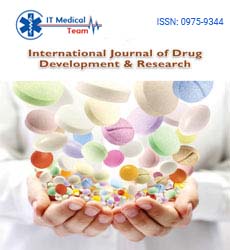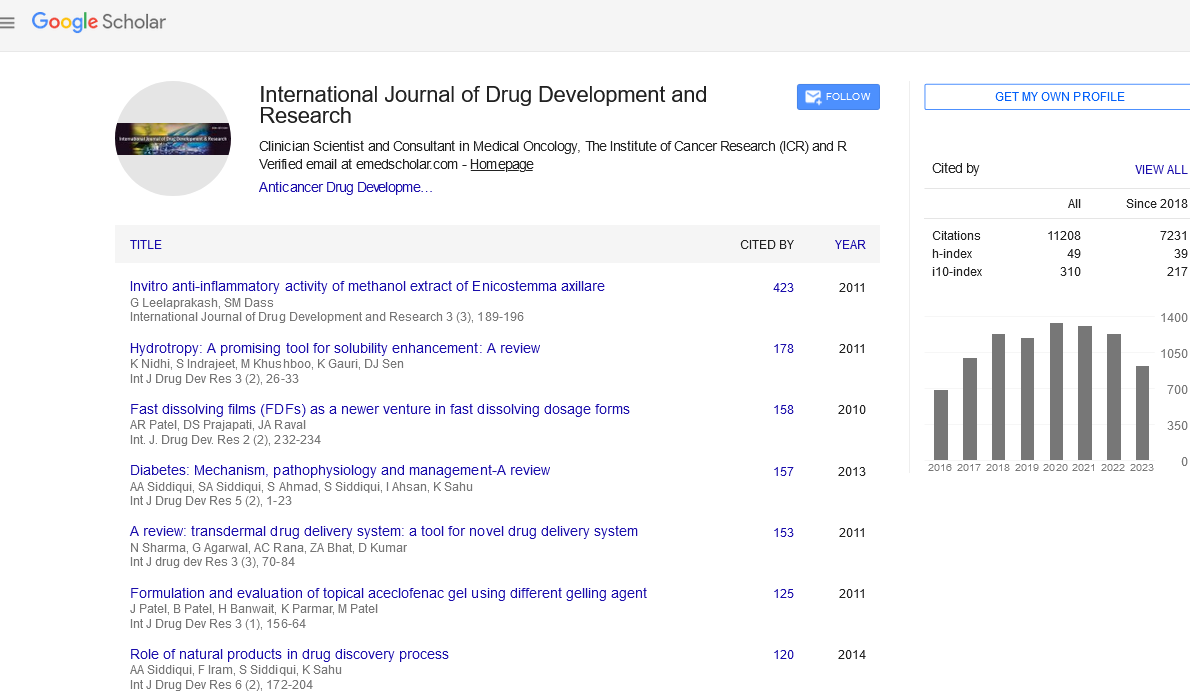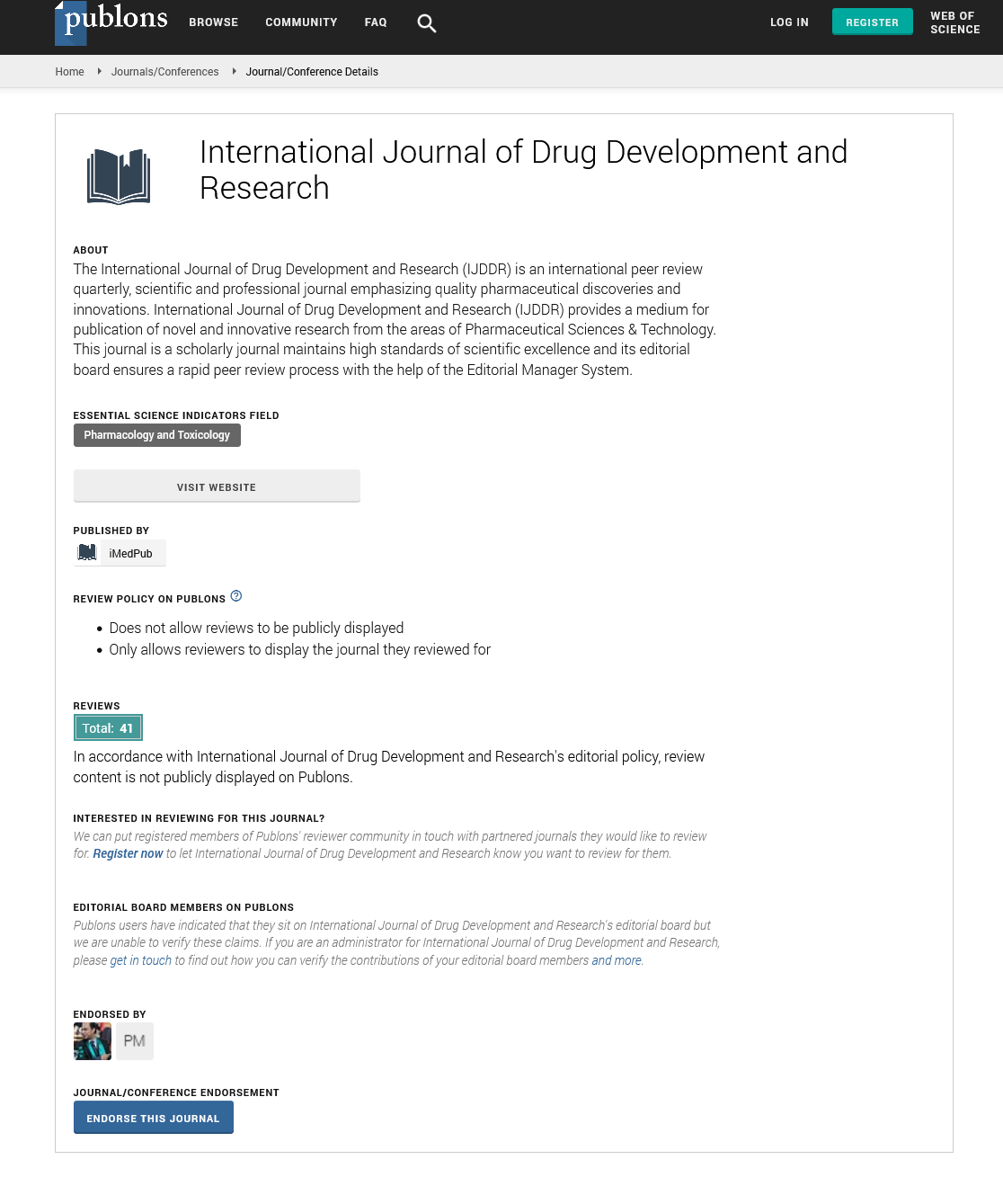Commentary - (2023) Volume 15, Issue 6
Unlocking human potential: The rise of smart drugs and brain stimulation
Elna Barnho*
Department of Pharmacy Practice, University of Aberdeen, Aberdeen, United Kingdom
*Correspondence:
Elna Barnho, Department of Pharmacy Practice, University of Aberdeen, Aberdeen,
United Kingdom,
Email:
Received: 03-Nov-2023, Manuscript No. ijddr-23-14311;
Editor assigned: 08-Nov-2023, Pre QC No. P-14311;
Reviewed: 22-Nov-2023, QC No. Q-14311;
Revised: 29-Nov-2023, Manuscript No. R-14311;
Published:
06-Dec-2023
Description
In a fast-paced world where cognitive demands are ever-increasing,
the quest for enhancing mental performance
has led to the exploration of novel methods, including
smart drugs and brain stimulation. As technology advances
and our understanding of the brain deepens, the concept
of "smart drugs" is evolving from science fiction to reality.
This article explores the fascinating realm of smart drugs
and brain stimulation, delving into their mechanisms,
potential benefits, and ethical considerations.
The promise of smart drugs
Smart drugs, also known as nootropics, are substances that
claim to enhance cognitive function, memory, creativity,
and motivation without causing significant side effects.
These substances range from traditional stimulants like
caffeine to more advanced pharmaceuticals designed to
target specific cognitive processes. One notable example
is modafinil, a wakefulness-promoting agent developed
to treat narcolepsy but increasingly used off-label for its
cognitive enhancing effects.
While the efficacy of smart drugs varies, some studies
suggest that certain compounds can indeed have positive
effects on cognitive performance. For instance, racetams,
a class of synthetic nootropics, have shown potential in
improving memory and learning. However, the long term
consequences and safety of these substances remain subjects
of ongoing research and debate.
Brain stimulation techniques
In addition to pharmacological interventions, another
frontier in cognitive enhancement involves non-invasive
brain stimulation techniques. Transcranial Magnetic
Stimulation (TMS) and transcranial Direct Current
Stimulation (tDCS) are two prominent methods that have
garnered attention for their potential to modulate brain
activity.
TMS uses magnetic fields to induce electric currents
in specific areas of the brain, affecting neuronal activity.
This technique has shown promise in treating various
neuropsychiatric disorders, and recent research suggests
its potential for cognitive enhancement. Similarly, tDCS
involves applying a low electric current to the scalp,
modulating the resting membrane potential of neurons and influencing cognitive processes.
The dual-edged sword
While the allure of cognitive enhancement is undeniable,
the use of smart drugs and brain stimulation raises ethical
and safety concerns. The concept of "biohacking" to
boost cognitive abilities prompts questions about fairness,
potential risks, and the long-term consequences of altering
the delicate balance of neurotransmitters in the brain.
Additionally, the long term safety of smart drugs and
brain stimulation remains uncertain, and the potential for
unintended consequences calls for cautious exploration of
these technologies.
The human brain: A complex system
Understanding the human brain is an intricate task,
and the complexity of its functions makes the pursuit
of cognitive enhancement a challenging endeavor. The
brain's adaptability, known as neuroplasticity, allows it
to reorganize itself in response to experience and external
stimuli. While this adaptability opens avenues for cognitive
enhancement, it also underscores the importance of
approaching these interventions with caution.
Researchers are keenly aware of the need to strike a balance
between unlocking the brain's potential and avoiding
unintended consequences. The delicate interplay of
neurotransmitters, neural circuits, and intricate feedback
mechanisms emphasizes the need for a nuanced and
comprehensive understanding of the brain's response to
external interventions.
The role of ethical oversight
As smart drugs and brain stimulation technologies continue
to advance, ethical oversight becomes paramount. A
framework that considers issues of consent, equitable
access, and long term safety must be established to
guide the responsible development and use of cognitive
enhancement tools.
Regulatory bodies and research institutions must collaborate
to ensure that the ethical implications of smart drugs and
brain stimulation are thoroughly examined. Transparent and
robust guidelines can help navigate the fine line between
progress and potential harm, fostering a responsible and
ethical approach to cognitive enhancement.
Conclusion
The landscape of cognitive enhancement is evolving rapidly,
driven by advancements in neuroscience, pharmacology,
and technology. Smart drugs and brain stimulation offer
glimpses into the untapped potential of the human brain,
raising hopes for improved cognitive function and quality
of life.
However, as we tread this uncharted territory, it is crucial
to approach these interventions with a keen understanding
of the brain's complexity and a commitment to ethical
considerations. The responsible development and use of
smart drugs and brain stimulation technologies hold the
key to unlocking human potential while preserving the
integrity of the mind. As we navigate the future of cognitive
enhancement, the synergy of scientific innovation and
ethical awareness will be instrumental in shaping a brighter,
more cognitively empowered tomorrow.






